Seven reasons Olympic Rugby Sevens is your new obsession
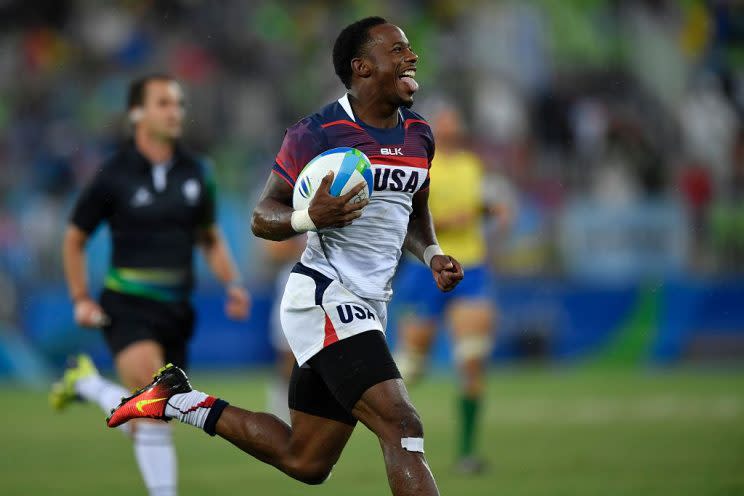
RIO DE JANEIRO – Rugby Sevens was the most entertaining, exciting and satiating event that I’ve covered over the course of two Summer Olympics. But then again, I have a really palpable love of brutality mixed with athletic artistry. I also have a really short attention span.
For the uninitiated, Rugby Sevens is a seven-player version of rugby, which has 15 players in its standard form. Instead of 40-minute halves of scrums, battles and broken bones, it’s two seven-minute halves of brisker offense and less frequent physical battles.
It’s well over a century old, but also well behind Fifteens in world popularity. But it was given an enormous boost in 2009 when the International Olympic Committee decided to add it as a Summer Games event for the 2016 Rio and 2020 Japan Olympics. (Rugby union, the 15-player version, hasn’t been a part of the Olympics since 1924.)
Many sports that thrive within their niche can get a serious boost from the Olympic stage – we see you, curling – and Rugby Sevens is no different. The kinetic energy and bite-sized games have made it one of the Rio Olympics’ buzziest hits.
“Sevens is so fast. So exciting. Fifteens take so long. It’s not 40 minutes, it’s seven minutes and anything can happen,” said a jubilant Perry Baker of Team USA, after the men’s team defeated Brazil on Tuesday in Deodoro. “Listen to the fans, man: They’re going crazy. Because it’s seven minutes.”
With that, here are seven reasons that Rugby Sevens is your new sports obsession.
It’s Pretty Much The Perfect American Sport, Outside Of The Fact That It Was Invented In Scotland

Let’s start with the obvious: Americans should be watching more rugby.
“It’s an incredible game that blends all these aspects of other sports. You have the tackling of football, the one-on-one-battles, the ball flying around like basketball, the competition in the air,” said Madison Hughes of Team USA.
But we’re very busy people, and the sports we like require us to dedicate blocks of time for them: Nine innings of baseball, an afternoon of football. Finding time for more sports is like asking an American to add a seventh meal to the day after breakfast, lunch, snack, dinner, dessert and late night indulgence. There are just not enough hours.
Which is why Rugby Sevens is pretty much a perfect American sport: two seven-minute halves, a two-minute break, and enough action contained therein to satisfy you.
The way the tournaments are structured, teams play multiple games in a day. In theory, you’ll watch every match, but in reality, you get your sports fix and then do whatever. “I think it’s just a free-flowing, action-filled game. And it’s quite short. You can come in, be overwhelmed by the action on the field, and then you move on to the rest of your day,” said Hughes.
Think of it in Netflix terms: Fifteens is that documentary you’ve been meaning to commit a few hours to watch, and Sevens is that rerun of “30 Rock” you actually end up watching.
Besides our short attention spans, Sevens also gives Americans something else we naturally crave: SCORING SCORING AND MORE SCORING!
It’s A Sleeker, Faster Game
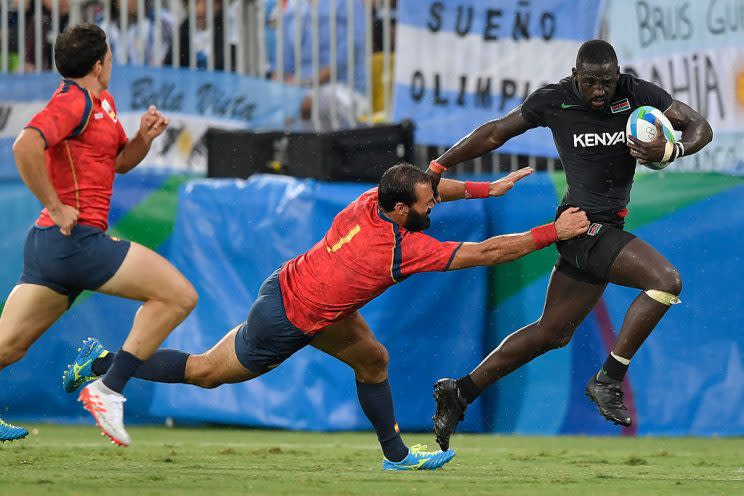
When you watch Fifteens, you’re watching an entertaining battle of attrition. There’s scoring to be sure, but there are far more scrums and stalling tactics meant to wear down foes and kill off the clock.
When you’re watching Sevens, you’re watching a game when an emphasis on speed and athleticism rather than brute force. To be sure, it still has scrums and moments where only the strong can survive, but it has far more moments of one-on-one battles and points on the scoreboard.
When you watch Fifteens, you’re watching a well-coached sport with systems in place to keep scoring limited and control possession methodically.
When you watch Sevens … well, toss the playbook in the trash, because it’s designed to subvert conservative play.
“The game is designed to be a high risk, high challenging sport. Systems get picked apart,” said Great Britain coach Simon Amor. “People who have watched Sevens this year know that you’d be a brave person to predict anything in Sevens.”
Which brings us to …
The Parity
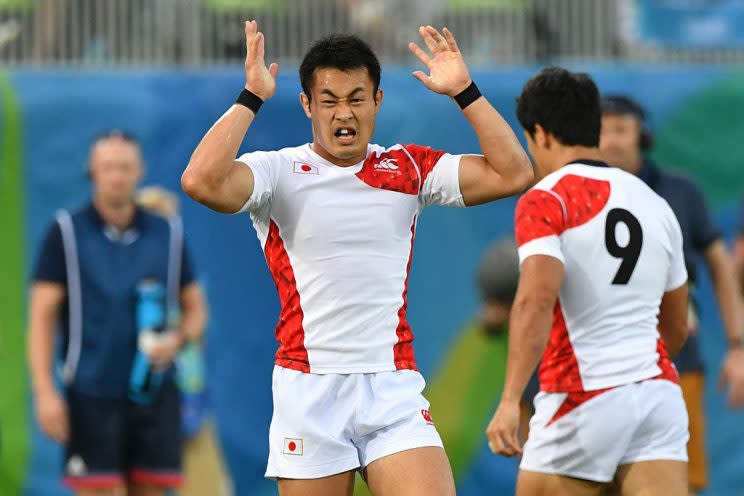
The nature of the beast in Rugby Sevens is that no team is safe. Ever. The matches are so short that seven athletes from any nation can put together a good 14 minutes and stun a favored opponent.
“It’s one of the things in Sevens. You might come in here with a reputation, but upsets are going to happen,” said Hughes.
Like when Team Canada, to the surprise of many, captured a bronze medal on the women’s side with a win over Great Britain.
And like when Japan shocked the men’s tournament.
Lote Tuqiri is a rugby player for Team Japan. When he arrived in Rio, the interest for his event was far outpaced by that of other events back home.
Then Japan went out and beat New Zealand, a nation in which children are born holding an All-Blacks shirt, and that all changed.
“We wanted to come here and give a good run against all the big boys,” he said. “Big deal. Especially back in Japan.”
For Japan, it was actually their second monumental rugby win in the last year, as their Fifteens upset South Africa in the World Cup. The win in Sevens underscored something fundamentally true about the version of rugby that’s not necessarily true in Fifteens: There’s global parity, for the most part.
“It’s the nature of where the teams are at, at the moment. Barring Fiji, who have their own brilliant kind of style, there’s a real strong level of ability,” said Team GB’s Amor. “The rollercoaster of Sevens goes up and goes down.”
And so do the fans.
The Fans

Sevens is famous for having a more relaxed vibe than Fifteens, which naturally fits the truncated games spread out over the course of a day. It’s like the difference between attending a stadium concert and a music festival.
That said, a Rugby Sevens crowd has the raucous camaraderie of soccer fans with some glorious elements of weirdness.
Seen at Rugby Sevens today pic.twitter.com/AO04Y1tLEA
— Greg Wyshynski (@wyshynski) August 9, 2016
I mean, where else in the Olympics are you going to see funny hats, men dressed as Wonder Woman and this guy in the same space?
⚡️ "Apparently Matthew McConaughey is a @USARugby fan ????"
OF COURSE, who wouldn't be?! #GoTeamUSA ????????https://t.co/MULvpOiYdu— U.S. Olympic Team (@TeamUSA) August 8, 2016
Alright alright alright …
The Players

While there are plenty of broad-shouldered brick-wall types in men’s and women’s Rugby Sevens, it’s a bit more inclusive for other body types than Fifteens, due to its open field and fewer scrums. Even if half the players look like they could be on the undercard of Wrestlemania.
But they’re also more approachable and relatable than, say, the players in Olympic soccer. Rugby has always had that “guy from your local pub playing pro” appeal. Or, in the case of Nate Ebner, that “guy from your local NFL team playing rugby” appeal.
Ebner, a safety for the New England Patriots, famously joined the U.S. Sevens team for the Olympics, and has been its highest profile player.
“We want to be trailblazers for something great in the United States. I love this sport. I want it to be a tremendous success,” he said.
Ebner is a pro football player and a rugby player. Before rugby was added to Rio 2016, the idea that he was going to ever win an Olympic medal was pretty slim. And now an elite athlete in the U.S. had a chance to do so … even if the Americans ended up far off the podium.
For some sports, the Olympics serve as their pinnacle. That’s not the case for Rugby Sevens, which has other tournaments (like the World Cup) that have a bit more importance than the gold medal, at least at this point.
But it really hit home for me how much it means to these athletes to now have a chance to be Olympians. I watched Regan Ware, a player of Māori descent for New Zealand, search out and hug his mother after one of their pool matches. The pride on her face in seeing her 22-year-old son competing in the Olympics was evident. When he first picked up a ball, she didn’t think that would be possible.
It’s the goal of every player in Olympic Rugby Sevens to get more young athletes to pick up a ball and play.
It’s An Adorable Little Brother
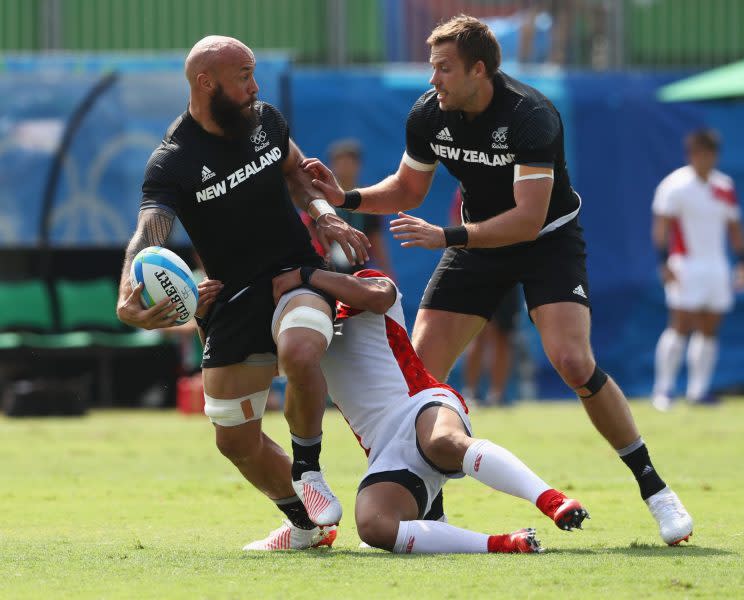
Rugby Sevens has been around since the 1880s, but it’s been living in the shadow of Fifteens for decades.
“Back home, there’s probably a few more people worried about the next Fifteens fixture that’s coming up,” said DJ Forbes of Team New Zealand. “But I guess that’s why I’ve committed myself to Sevens, along with some of the other boys. Just to change the scene a little bit. Hopefully in the next four years, or maybe the next eight years, there will be a lot of little kids running around wanting to play.”
It’s the same thing Tuqiri hopes for Japan. “Rugby Sevens isn’t a big deal in Japan, so it’s a big boost. Especially with the next Olympics in Japan. We need more players participating in Sevens. Being in the development program,” he said.
And there might be a chance to capture those young players, because …
Rugby Sevens Is A Beautiful Freak Sport
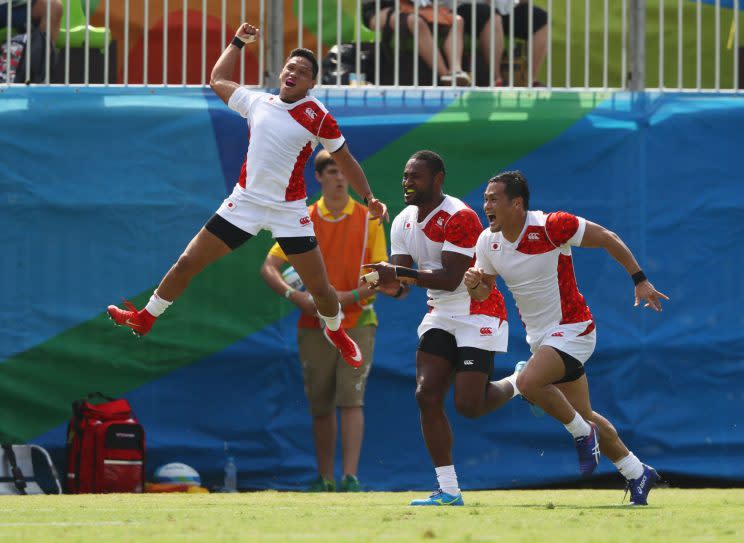
Many rugby fans look down on Sevens because it’s not Fifteens. As an American, it reminds me of the arguments against 3-on-3 hockey or street basketball: That they’re bastardizations of the “pure” versions of the sport and hence must be frowned upon.
Which of course ignores the fact that the sports world is big enough for several variations on the same theme, especially when those variations are like an injection of Pixy Stix sugar into your cerebral cortex like Rugby Sevens is.
Thus, it’s a version of the sport you root for to thrive, because Rugby Sevens the 2-and-a-half-minute Sex Pistols song to Rugby union’s “Stairway To Heaven,” and sometimes that’s just want you need.
And I certainly didn’t realize how much the Olympics needed it until Rio 2016. Hopefully it’s here to stay; or, at least, it hangs round long enough for the U.S. to figure out how to dominate it.
Then it’ll really be our sports obsession …
—
Greg Wyshynski is a writer for Yahoo Sports. Contact him at puckdaddyblog@yahoo.com or find him on Twitter. His book, TAKE YOUR EYE OFF THE PUCK, is available on Amazon and wherever books are sold.
Listen to Yahoo Sports’ Greg Wyshynski podcast from Rio on GRANDSTANDING, featuring beach volleyball’s April Ross:
Grandstanding: A Yahoo Sports podcast
Subscribe via iTunes or via RSS feed

 Yahoo Sports
Yahoo Sports 

